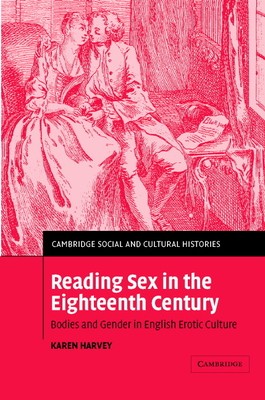
- We will send in 10–14 business days.
- Author: Karen Harvey
- Publisher: Cambridge University Press
- ISBN-10: 0521822351
- ISBN-13: 9780521822350
- Format: 16.4 x 23.6 x 2.1 cm, kieti viršeliai
- Language: English
- SAVE -10% with code: EXTRA
Reviews
Description
Karen Harvey explores the construction of sexual difference and gender identity in eighteenth-century England. Using erotic texts and their illustrations, and rooting this evidence firmly in historical context, Harvey provides a thoroughgoing critique of the orthodoxy of work on sexual difference in the history of the body. She argues that eighteenth-century English erotic culture combined a distinctive mode of writing and reading in which the form of refinement was applied to the matter of sex. Erotic culture was male-centred and it was in this environment, Harvey argues, that men could enjoy both the bawdy, raucous, libidinous elements of the eighteenth century and the refined politeness for which the period is also renowned. This book makes a significant contribution to the history of masculinity and advocates an approach to change in gender history, one capable of capturing the processes of negotiation and contestation integral to cultural change.
EXTRA 10 % discount with code: EXTRA
The promotion ends in 22d.01:46:47
The discount code is valid when purchasing from 10 €. Discounts do not stack.
- Author: Karen Harvey
- Publisher: Cambridge University Press
- ISBN-10: 0521822351
- ISBN-13: 9780521822350
- Format: 16.4 x 23.6 x 2.1 cm, kieti viršeliai
- Language: English English
Karen Harvey explores the construction of sexual difference and gender identity in eighteenth-century England. Using erotic texts and their illustrations, and rooting this evidence firmly in historical context, Harvey provides a thoroughgoing critique of the orthodoxy of work on sexual difference in the history of the body. She argues that eighteenth-century English erotic culture combined a distinctive mode of writing and reading in which the form of refinement was applied to the matter of sex. Erotic culture was male-centred and it was in this environment, Harvey argues, that men could enjoy both the bawdy, raucous, libidinous elements of the eighteenth century and the refined politeness for which the period is also renowned. This book makes a significant contribution to the history of masculinity and advocates an approach to change in gender history, one capable of capturing the processes of negotiation and contestation integral to cultural change.


Reviews